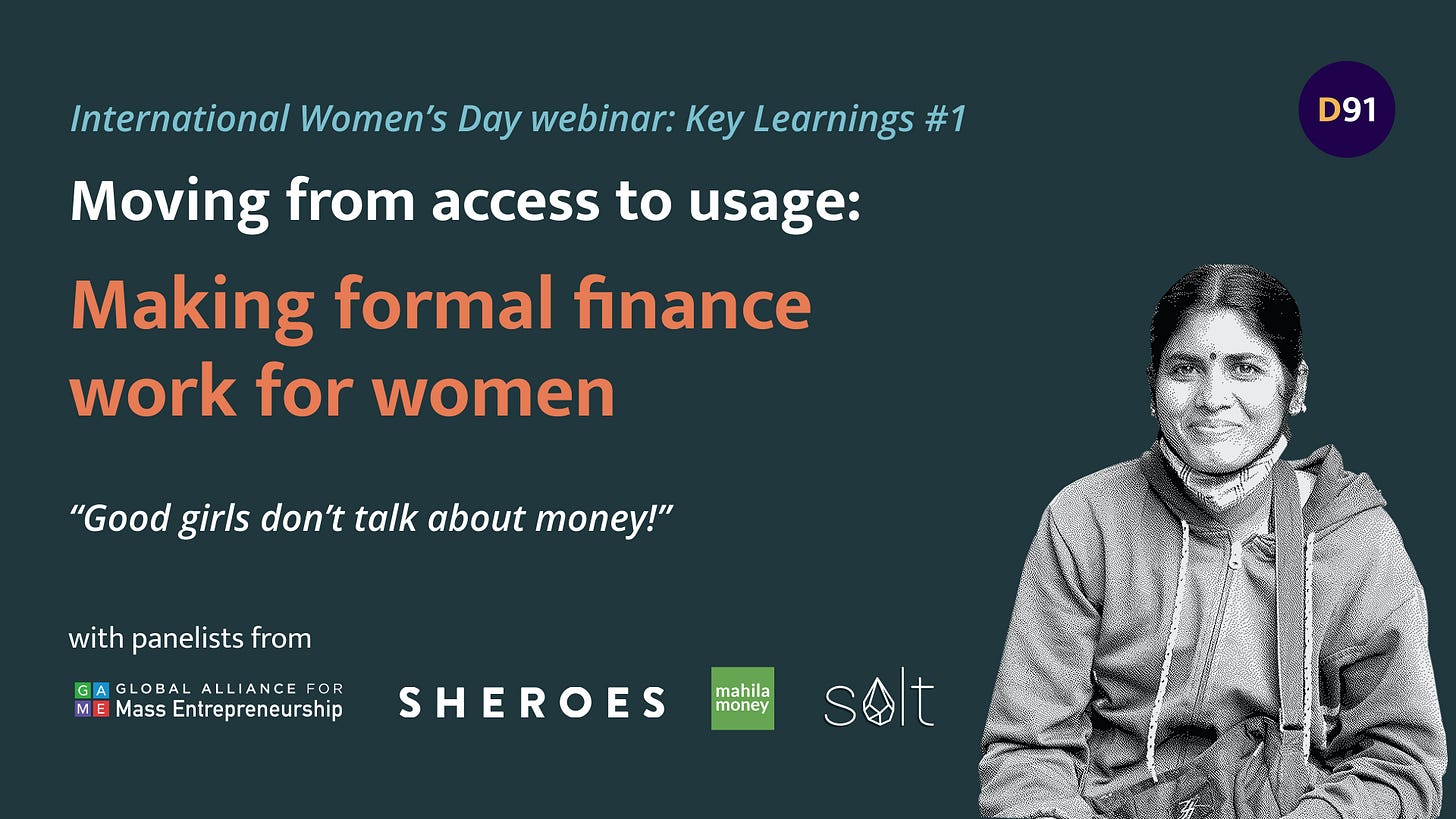Good girls don't talk about money!
We hosted a webinar on women’s financial inclusion by bringing together the experience of 6 women working at the intersection of finance, tech & research for women. Here’s part 1 of our key learnings!
Women and finance have been a heavily discussed yet somewhat elusive topic over the years. While smartphone penetration and the increased access to bank accounts among the Indian population (including women) have been lauded by many, their potential to transform the financial lives of women remains untapped.
Many of us may intuitively feel like we know the reasons why such a large section of the women population remains excluded from formal finance. But, in the way that a product journey is incomplete if there is access to products but no usage of products, the awareness of why women are excluded is not enough to solve for their exclusion. There are a few more important steps to reach the lofty goal of financial inclusion for women! However, it’s a good starting point nonetheless.
So, we asked our panelists, what are some of the life circumstances that affect women’s financial needs and does that mean there is a more pressing need for women to plan their finances than men?
“A woman’s life starts with a little subtraction” said Sairee Chahal, Founder and CEO of SHEROES and Mahila Money, as she went on to discuss the deeply systemic issues of patriarchy that more often than not see a girl child in the negative column of the family balance sheet.
As they grow older down the road, the next turning point arises in a woman’s life through her marriage. The universality of marriage and the many roles that follow - a wife, a mother, a caregiver to the family elders to name a few, become the key drivers of all decision making around building not only a career but also any form of personal wealth.
When careers take a hit, a return to the workplace after years of family life, a woman finds herself at the other end of another set of deeply pervasive problems in the office i.e. those of pay parity and gender biases. These naturally impact her standing as an individual within society without the gender roles assigned to her over time.
Little by little, this chips away at the confidence that women feel in their ability to handle important personal matters such as finances.
While it may appear like a problem that women in rural India or even Tier II or Tier III cities may face, this disengagement with individual financial lives exists even among the ‘privileged’ women from Tier I cities that seemingly have dealt with lesser barriers growing up.
As Chaitra Chidanand, Co-Founder of Salt.one eloquently articulated -
“Good girls don’t talk about money” This is a catch-all that applies to women regardless of their socio-economic backgrounds, upbringing, and life circumstances. As she and her team at Salt.one discovered through interviews with women from all around the country, this disengagement from financial decision making has been wrongly diagnosed as a knowledge problem but is in fact a problem of wanting to take perfect action and therefore taking no action at all!
Chaitra went on to explain that industrialisation of finance has propagated a myth that financial decision-making is about calculated and fact-based findings with intuition playing little to no role whatsoever. For women, who are inherently creatures of intuition, it becomes hard to take action since no amount of information seems adequate enough in pursuit of the perfect action.
To top that up, women over time have learned that for every erroneously taken decision, the consequences are likely to be the revocation of the privilege to take that or any similar decision in the first place.
The instinct to protect girls from harm in their childhood by taking away their privilege to do things independently while in the same circumstances compelling boys to dust off the mud and figure a way out for themselves is the baseline that women carry through life.
As Chaitra said, “their biggest competitor in their journey with Salt.one so far is the well-meaning father”.
When dealing with finances, women find it a lot harder to bring problems or issues back home because they believe their privilege to handle their own affairs might get taken away by a well-meaning father or husband. A cumulative effect of this need for perfect action, therefore, is inaction.
In addressing life circumstances that affect women differently from men, there is a scope to design products that account for the non-linear nature of a woman’s professional and financial journey. The breaks in income streams, movement from full-time to part-time positions and the variability in the quantum of income are the primary features that need to be addressed through gender sensitive products.
However, an interesting shift in the lifestyle of the ‘privileged’ class with higher disposable income is that even among men, career graphs and income streams are taking a nonlinear turn. There are sabbaticals, entrepreneurial pursuits and just moves to non-traditional income sources that make the future of the Gen Z men folk also similar to that of women traditionally, although for completely different reasons and definitely by choice.
And therefore building gender-sensitive products for the women cohort in many ways will mean building products for this future as well!
But, is building products really enough? That’s the question we will aim to answer by discussing the barriers to the usage of these financial products and services in the next blog! Stay tuned!
Can’t wait for the next blog, see the webinar on our brand new YT channel!
All artwork has been designed by Prajna Nayak.
If you enjoyed reading this blog and would like to receive more such articles from D91 Labs, please subscribe to our newsletter here.
You can follow us on Twitter | LinkedIn | Instagram | YouTube






